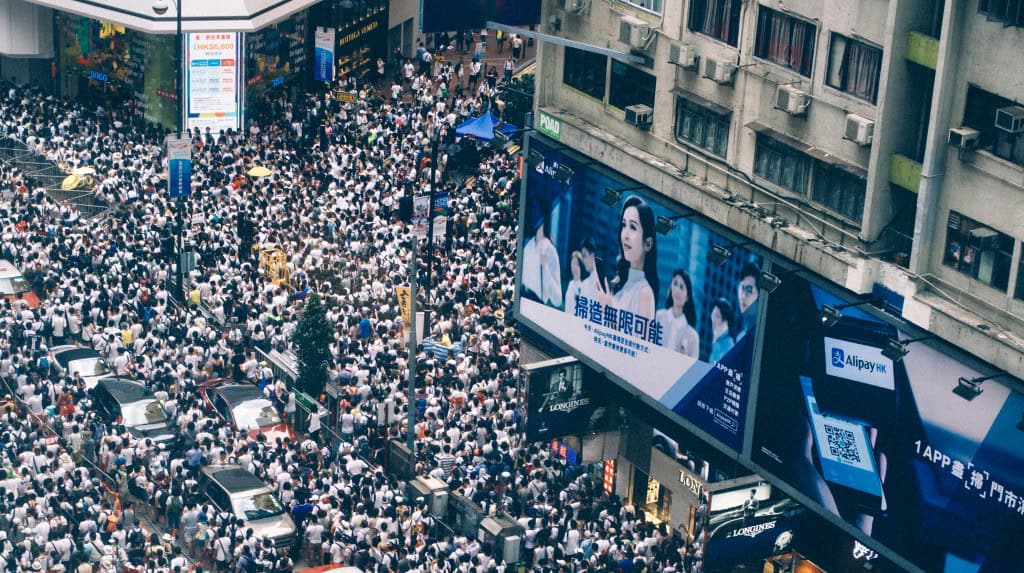If you’re planning on visiting Hong Kong over the coming weeks and months, here’s what you need to know.
You can’t have escaped what’s currently happening in Hong Kong.
Hundreds of thousands of protesters have taken to the streets in recent weeks ostensibly in reaction to an extradition bill proposed by the pro-Beijing camp within the territory’s Executive Council.
At the time of publication, the bill has been declared “dead” by Hong Kong chief executive Carrie Lam, but until it is formally withdrawn – among other demands from protesters – demonstrations show no signs of stopping.

What’s happening?
The extradition bill – which would give China power to transfer fugitives out of Hong Kong and into the mainland – was proposed in February. Within a few weeks, pro-democracy protesters in Hong Kong had mobilised on the streets for the first in a series of demonstrations.
This culminated on July 1 – the anniversary of Britain officially handing back control over Hong Kong – when protesters stormed the region’s Legislative Council and raised a British-era colonial flag in defiance of China.
Accurate figures for protester numbers are hard to come by with organisers claiming close to two million people taking part at its peak. This is disputed by Hong Kong police sources.
Either way, the proposed bill has brought people out on the streets in numbers never seen before in a direct challenge to Beijing.
More protests are promised by organisers until a series of demands are met (not least of which is a formal repeal of the bill).

Why is it happening?
The motivation behind protesters’ ire runs much deeper than the extradition bill and incorporates growing fears over China’s reluctance to honour the ‘One country, two systems’ principle of governance which has existed since the reunification of the territory in 1997.
Hong Kong is scheduled to become fully assimilated into China in 2047 but various perceived infringements on the rights of the territory’s citizens have led to growing unease.
As China strives to exert more control over Hong Kong, the coming weeks and months will tell how much ‘disobedience’ it is willing to tolerate.

Where are the protests taking place?
Hong Kong is made up of three main parts: Hong Kong Island, Kowloon, and the New Territories.
Many protests so far have been centralised around the Legislative Council building in the central business district on Hong Kong Island.
However, in an effort to bring the issue to the attention of mainlanders, demonstrations have recently migrated to Kowloon – a popular shopping destination for Chinese tourists.

Is Hong Kong safe to visit?
Yes. For the time being.
The recent protests – although massive in numbers – have been remarkably peaceful. The targets of protesters’ anger have been pro-China legislative members and the Chinese state itself. Foreigners have not been targeted in any way.
But growing frustration from Beijing about the failure to pacify the protests has the potential to lead to a much more robust response in coming weeks.
The view from Hong Kong
Face caught up with “Sean” (not his real name), a Hongkonger in his mid 30s, to find out what the perspective was from inside the territory.
He said: “The general feeling is we are simply really sick and tired of what the government of mainland China is trying to do to us. Obviously, the whole thing started with the extradition bill but it evolved into a general stand against the government.
“There’s a certain amount of fear because we’ve seen what the police are willing to do to the protesters. But we’re also optimistic because we have never been so united.
“The sole purpose we have is protesting against the government. We’re not targeting tourists or foreigners at all.
“There might be temporary inconvenience for tourists, of course. Maybe they cannot go shopping in a certain place because protests have shut off access, but in terms of physical safety, it’s not currently an issue.”
How do I find out more?
If you’re visiting Hong Kong and want to avoid getting caught up in protests, consult international media. For the most up-to-date info, also check out Hong Kong Free Press and Real Hong Kong News (both on Facebook).










